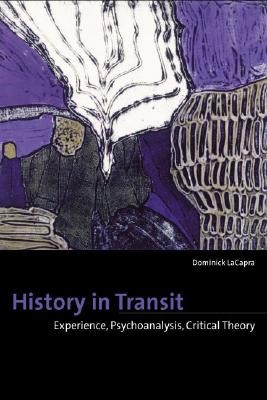
- We will send in 10–14 business days.
- Author: Dominick Lacapra
- Publisher: Cornell University Press
- ISBN-10: 0801442540
- ISBN-13: 9780801442544
- Format: 15.1 x 23.4 x 2.5 cm, kieti viršeliai
- Language: English
- SAVE -10% with code: EXTRA
Reviews
Description
History in Transit comprises Dominick LaCapra's explorations of relationships he believes have been insufficiently theorized: between experience and identity, between history and various theories of subjectivity, between extreme events and their representation, between institutional structures and the kinds of knowledge produced within them. Taken together, these discussions form a dialogical encounter, positing the links among epistemological questions, historicist ones, and issues pertaining to disciplinary and institutional politics.
Reacting against the antitheoretical bias of some prominent historians, LaCapra presents an alternative model of historiographical practice--one in which emphases on plurality and hybridity are combined with the concept of historical experience. For LaCapra experience emerges as a category both theoretically determined and anchored in the facticity of the everyday. LaCapra tests the assumptions and implications of the way one approaches the past by looking to psychoanalysis to render more self-aware the relationship between the historian and his or her material. He offers criticisms of assumptions held by practicing historians and theorists, placing the study of history at the center of a larger argument about the role of the contemporary university.
Contesting both corporatization and claims that the university is in ruins, LaCapra writes, "It is paradoxical that the demand to make the university conform to an ever-increasing extent to a market or business model seems oblivious to the fact that the American university has probably been the most successful of its type in the world, that students from other countries disproportionately desire to study in it."
EXTRA 10 % discount with code: EXTRA
The promotion ends in 22d.15:24:07
The discount code is valid when purchasing from 10 €. Discounts do not stack.
- Author: Dominick Lacapra
- Publisher: Cornell University Press
- ISBN-10: 0801442540
- ISBN-13: 9780801442544
- Format: 15.1 x 23.4 x 2.5 cm, kieti viršeliai
- Language: English English
History in Transit comprises Dominick LaCapra's explorations of relationships he believes have been insufficiently theorized: between experience and identity, between history and various theories of subjectivity, between extreme events and their representation, between institutional structures and the kinds of knowledge produced within them. Taken together, these discussions form a dialogical encounter, positing the links among epistemological questions, historicist ones, and issues pertaining to disciplinary and institutional politics.
Reacting against the antitheoretical bias of some prominent historians, LaCapra presents an alternative model of historiographical practice--one in which emphases on plurality and hybridity are combined with the concept of historical experience. For LaCapra experience emerges as a category both theoretically determined and anchored in the facticity of the everyday. LaCapra tests the assumptions and implications of the way one approaches the past by looking to psychoanalysis to render more self-aware the relationship between the historian and his or her material. He offers criticisms of assumptions held by practicing historians and theorists, placing the study of history at the center of a larger argument about the role of the contemporary university.
Contesting both corporatization and claims that the university is in ruins, LaCapra writes, "It is paradoxical that the demand to make the university conform to an ever-increasing extent to a market or business model seems oblivious to the fact that the American university has probably been the most successful of its type in the world, that students from other countries disproportionately desire to study in it."


Reviews